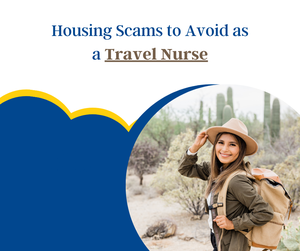Body
Understanding Housing Scams
Before delving into preventive measures, it's essential to understand the common types of housing scams prevalent in the travel nursing industry. Awareness is the first line of defense against these deceptive practices. Here are some typical housing scams to watch out for:
- Fake Listings: Scammers create fake listings for non-existent properties or use stolen images and descriptions to attract unsuspecting nurses.
- Wire Transfer Requests: Fraudsters may request advance payments or security deposits via wire transfers, making it difficult to trace or recover the funds if the deal turns out to be a scam.
- Unverified Sources: Be cautious of housing offers that come from unverified sources or individuals who cannot provide proper credentials or references.
- Phishing Attempts: Scammers may use phishing emails or websites to trick you into revealing personal information or login credentials.
- Identity Theft: Some scams involve identity theft, where scammers collect personal information for malicious purposes.
Researching and Verifying Housing Options
When searching for housing for travel nurse, it's essential to conduct thorough research and verify the legitimacy of potential options. Here are the steps you should follow:
- Start Early: Begin your housing search well in advance to allow ample time for research and verification.
- Utilize Trusted Platforms: Rely on reputable websites and platforms specifically designed for healthcare professionals, such as trusted travel nurse housing agencies or nurse forums.
- Read Reviews: Take the time to read reviews and testimonials from other travel nurses who have stayed in the same location. Their experiences can offer valuable insights.
- Contact Hospital Housing Coordinators: Reach out to the housing coordinators at the hospitals or medical facilities where you will be working. They often have resources and recommendations for safe housing options.
- Verify Property Ownership: Request proof of ownership or authorization from the landlord or property manager before making any payments or commitments.
Red Flags to Watch Out For
While conducting your housing search, keep an eye out for warning signs that may indicate a potential scam. Here are some red flags to be aware of:
- Unrealistic Pricing: If a housing option seems too good to be true, it probably is. Unrealistically low prices can be a sign of a scam.
- Pressure Tactics: Scammers may use pressure tactics to rush you into making a hasty decision. Be cautious if you feel forced to make immediate payments or commitments.
- Incomplete or Inconsistent Information: Pay attention to incomplete or inconsistent information provided by the landlord or property manager. Legitimate listings usually have accurate and detailed descriptions.
- Poor Communication: If the communication with the landlord or property manager is consistently vague, unprofessional, or inconsistent, consider it a warning sign.
- Unsecure Payment Methods: Be wary of landlords who only accept wire transfers or prepaid debit cards. Legitimate landlords typically offer secure payment options.
Protecting Your Personal and Financial Information
One of the primary objectives of housing scammers is to obtain your personal and financial information. To protect yourself, follow these best practices:
- Use Secure Websites: When submitting personal information or making payments online, ensure that the website has a secure connection (look for "https" in the URL and a padlock icon in the browser).
- Be Cautious with Personal Information: Avoid sharing sensitive personal information, such as your Social Security number or bank account details, unless you are certain about the legitimacy of the housing option.
- Avoid Public Wi-Fi: When accessing housing-related websites or conducting online transactions, avoid using public Wi-Fi networks, as they may not be secure.
- Monitor Your Accounts: Regularly monitor your bank accounts and credit card statements for any suspicious activity. If you notice anything unusual, report it immediately.
- Use Strong Passwords: Create unique and strong passwords for your online accounts, and consider using a password manager to securely store and manage them.
Reporting Scams and Seeking Legal Assistance
If you encounter a housing scam or suspect fraudulent activity, it's crucial to report it and take appropriate action. Here's what you should do:
- File a Report: Report the scam to your local law enforcement agency and provide them with all the relevant information you have.
- Contact the Website: If you found the fraudulent listing on a website, notify the website administrators or customer support so they can investigate and potentially remove the scammer's account.
- Warn Others: Share your experience on nurse forums or social media platforms to raise awareness and prevent other healthcare professionals from falling victim to the same scam.
- Seek Legal Advice: If you have suffered financial losses or identity theft due to a housing scam, consult with an attorney who specializes in fraud cases to explore your legal options.
By being vigilant, conducting thorough research, and following the preventive measures outlined in this guide, you can significantly reduce the risk of encountering housing scams as a travel nurse. Remember, your safety and peace of mind are paramount, and with the right knowledge, you can enjoy a worry-free housing experience during your assignments.













Comments